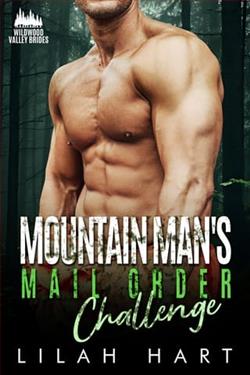Page 67 of So Far Gone
“Beth—”
She glanced up, a neutral look on her face.
“Look, I don’t know if this is the right time, but please hear me out. I need to say some things.” She didn’t stop him this time, and Kinnick went on: “I amnotdisappointed in you. I’m sorry I gave you that impression. And I’m sorry that I took out whatever issues I had with your partners on you. That was wrong of me. I have wanted to say that to you many times over the last few years—”
She flinched atlast few years—as she should, of course, unconscionable he should be out of her life for so long—but Kinnick knew that he had to keep going, to get it all out. “You know, a friend recently asked what I learned living alone in the woods. When people ask me that, the only things I can ever think of are quotes from people who’ve said it before. Aristotle. Thoreau. But I’m starting to think Thoreau might have been full of shit. If we aren’t living for others, maybe we aren’t really living.”
He took a deep breath. “When you came to visit me last time, you asked if I had seen you skipping school when you were fifteen. Well, I did. I saw you that day. I watched you drive past the house with that boy. And I never said a thing. Because I was with someone I shouldn’t have been with, too.”
Bethany just stared at him, no reaction on her face.
“But you probably knew that. Bethany... I am so full of regret.And shame. For turning my back on you that way. And not just seven years ago. And not just because of Shane. So... what I wanted to say... is that I am sorry. For so many things. But maybe we could just start with that?”
The breath seemed to catch in Bethany’s throat. She inhaled deeply.
“I’ve been trying to figure something else out,” Kinnick said. “When you were going through such a hard time these last weeks, after your mother died, why you sent the kids to be withme? And I could only think of two possible answers. Either you wanted to send me a message. Or you really needed me. And I just want to say, whichever it is, I’m here for it.”
Still, that noncommittal look on her face. Then, finally, a small nod.
Kinnick took a step toward her. “I know I’ve got a lot of years to make up. And I know I can’t do it in a day. But I’d like to start now, if that’s okay.”
Kinnick took a few more steps, reached out, and tentatively took his daughter in his arms. She stiffened at first, then shuddered and began crying, and finally collapsed against his chest.
Kinnick whispered, “I’m sorry,” and “It’s going to be okay,” and “I’m sorry,” again.
She managed to say only, “Dad,” and he squeezed her tighter.
And then he felt smaller arms around his waist, Kinnick looking down to see Asher, out of the shower, hair wet, barefoot, dressed in sweatpants and no shirt, his arms around them both. “What are we hugging about?”
***
In the car afterward, Bethany felt drained by her brief, cathartic cry. Ever since the panic attacks at Paititi, or maybe since her mother’s death, or shoot, maybe most of her life, she’d concentrated on breathing shallowly, thinking clearly, focusing on each small step—trying to getthrough the days without her mother, get through the festival, get back to her kids, talk Shane down from his anger—to keep her thoughts always near the surface, and therefore, keep her emotions at bay, for now, at least until they got Leah back.
But her dad’s apology had caught her off guard, and she’d allowed herself to go deeper, into the past, melting into his arms the way she did when she was nine or ten, even as she’d puzzled over his last question: Whyhadshe sent the kids to be with him? He’d shown almost no interest in them, or her, for so much of her life.Wasshe sending him a message? Or was she just so desperate for help that she’d had nowhere else to turn? She wished again she hadn’t lost her health insurance, so that she could see her therapist, Peggy, and ask those questions (and have Peggy repeat them back to her). But then, immediately after crying in Rhys’s arms, predictably, Bethany had thought of a hundred things her father’s apology hadnotcovered, a thousand things to still be angry at him about, a million things he’d missed over the last seven years, over the lasteighteenyears. But something he’d said—I’d like to start now—had given her pause. When she thought about all that her father had missed in the last seven years, since his retreat to the woods, she reflected on how hard those years had been—losing her job, losing her mother, the pandemic, the kids having to leave their school, and, in the center of it all, like a tornado, Shane’s deepening drift into this end-times theology. My God, she was tired. She had needed...something... and it clearly wasn’t running off to a music festival in Canada.
So, maybe it was letting her dad “start”? And her, too, maybe she could allow herself to begin forgiving Rhys, allow him to try to help—without entirely relying on him, of course, after all, he’d only had one job: watch her kids for a few days, while she went to see Doug’s band play. And look how that had turned out.
She glanced over at her father now, in the driver’s seat of his friend’s Subaru. What exactly did she expect he could do? The man didn’t even have a running car. As a kid, she’d always seen him as so reliableand knowledgeable, a series of squares: square jawline, square shoulders, square hair, a man of perfect right angles, a paragon of rational thought, like he was a book himself—but the edges had long ago worn off. She used to dread his harsh judgments, the way his lips would set, and his eyes would narrow, the way he’d say, “You didwhat, now?” But here was a softer, more introspective old man, seemingly humbled by life. An old, battered book, its pages faint and yellowed.
“Anything?” He looked over at her.
Right. Her phone. Bethany looked down at the screen (as if she wouldn’t have felt the vibration or heard the ringtone). “Nothing.” She had tried calling Shane again before they left the apartment, but it had gone directly to voicemail. And Pastor Gallen hadn’t answered his phone, either.
And so, she and Rhys and the freshly showered Asher had piled in Brian and Joanie’s Subaru and started back through the streets of Spokane, headed east, toward Idaho, and eventually, to the Rampart. To Shane. To the end of days. Or maybe the end of her marriage. So many borders they’d end up crossing this week.
“I’m not exactly excited to go back to that place,” her father said.
“Yeah. Me neither.” Best case: Cross looks from Shane and Pastor Gallen. A stern lecture that she submit to her man. Daughter married at sixteen. Worst case: the Blessed Fire congregation stoning Shane’s wayward wife to death.
Kinnick asked if they could make a quick stop. “I need to check on a friend. It will only take a minute. And it’s on the way.”
He parked in front of a blue duplex and ran up to the unit on the right. Bethany watched him ring the doorbell and bounce nervously on the balls of his feet. He looked back once and held up a finger: just a minute. Finally, a short, pretty Asian American woman came out onto the porch in a robe, a cup of coffee in her hand. She came all the way outside, easing the front door closed behind her. She and Rhys launched into what looked like a spirited discussion, Bethany wonderingif this was the same woman she’d seen on her parents’ porch when she was fifteen. So long ago—it was impossible to tell. Maybe her dad had a type. She opened her car door slightly and caught her father midsentence: “—can’t believe he’s here.”
“Oh, he’s here,” the woman answered. “The doctors said he could go home anytime—if he had someone to look after him. He practically sprinted out of that hospital and into my fucking car.”
“Oh, Lucy,” her dad said, “I’m sorry.”
“You’re sorry? Right. And I’m a fucking nursemaid thanks to you—”















